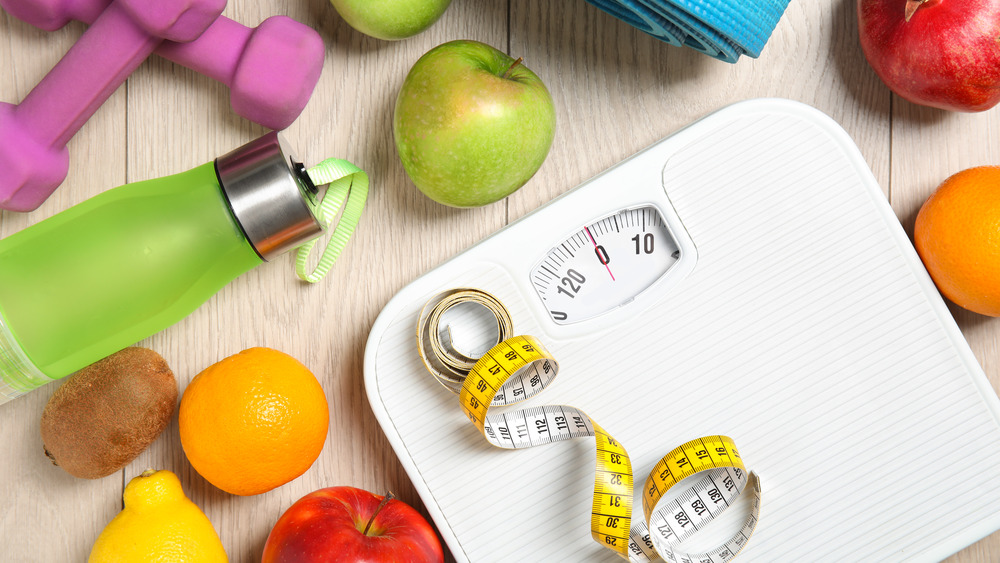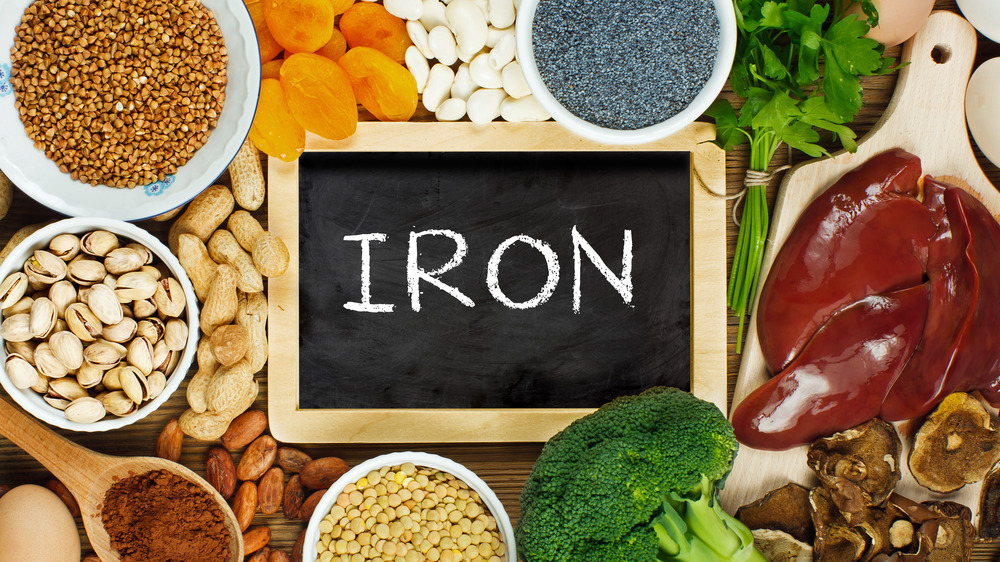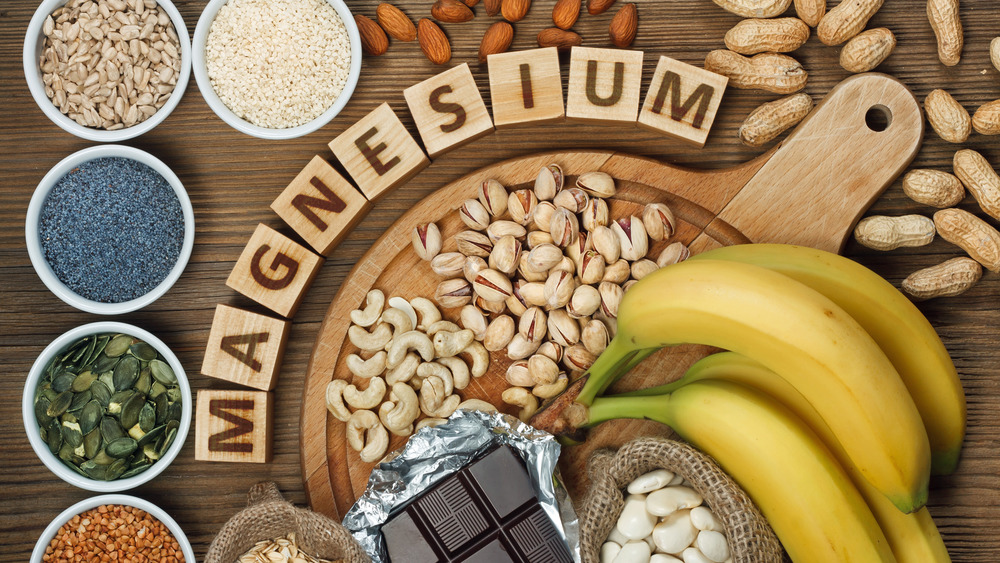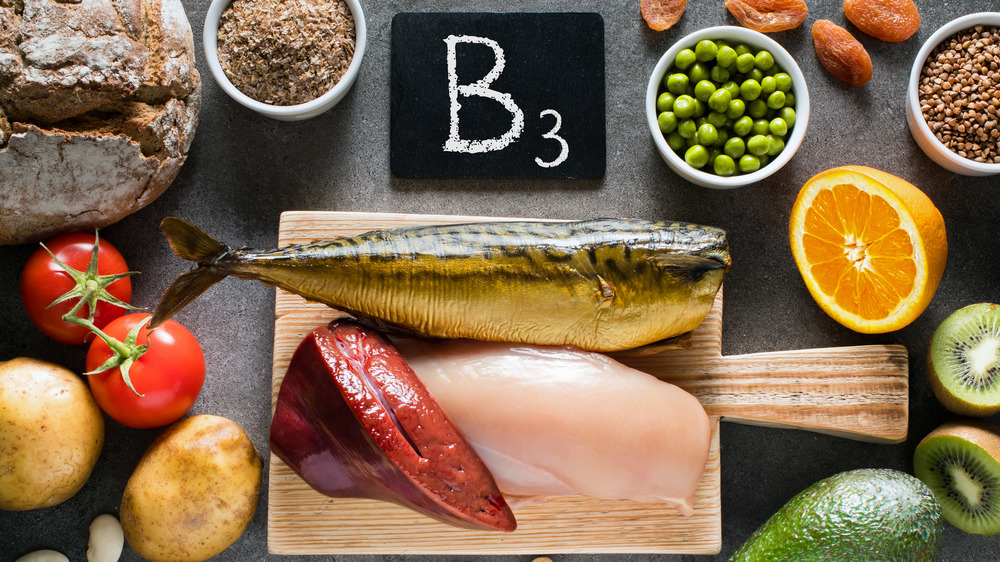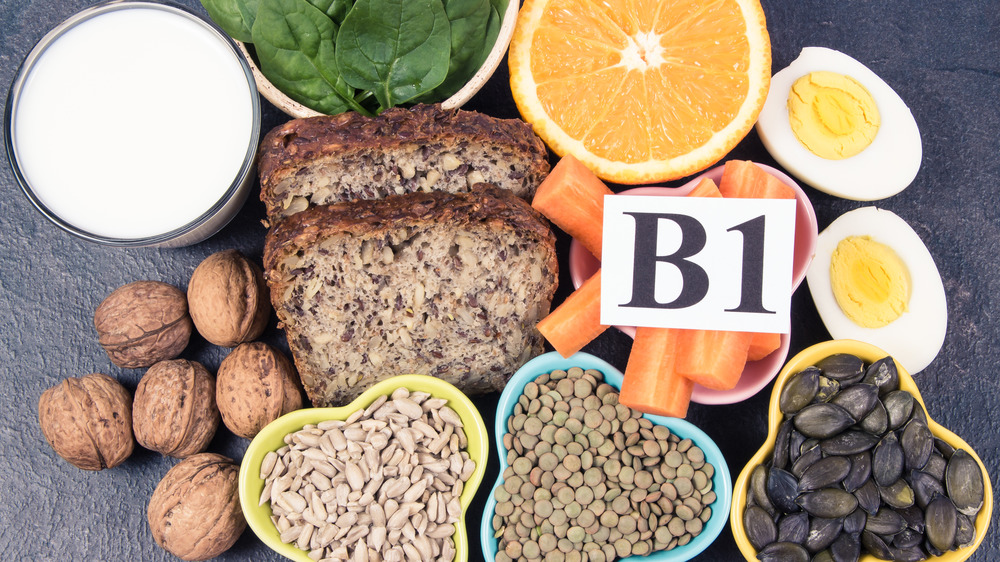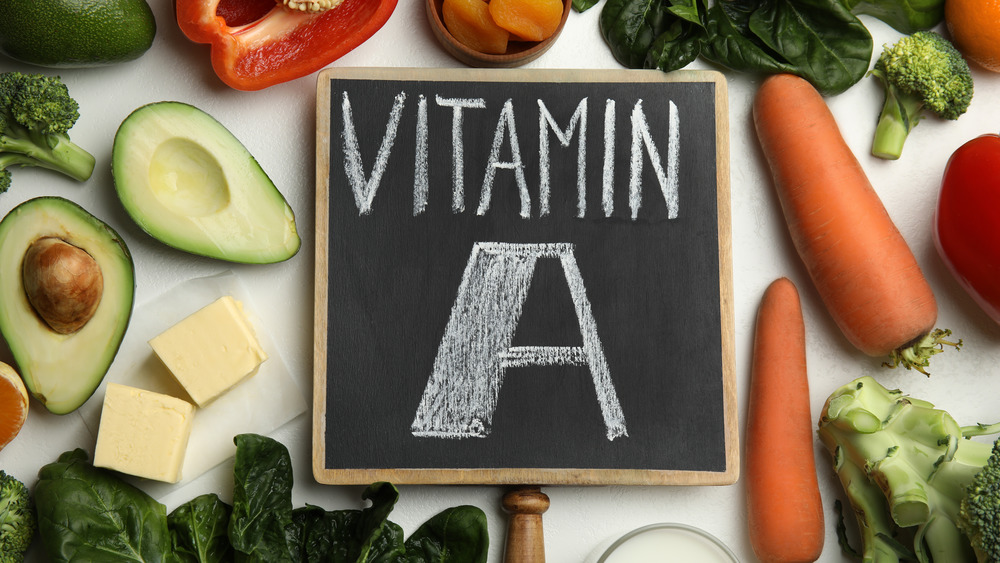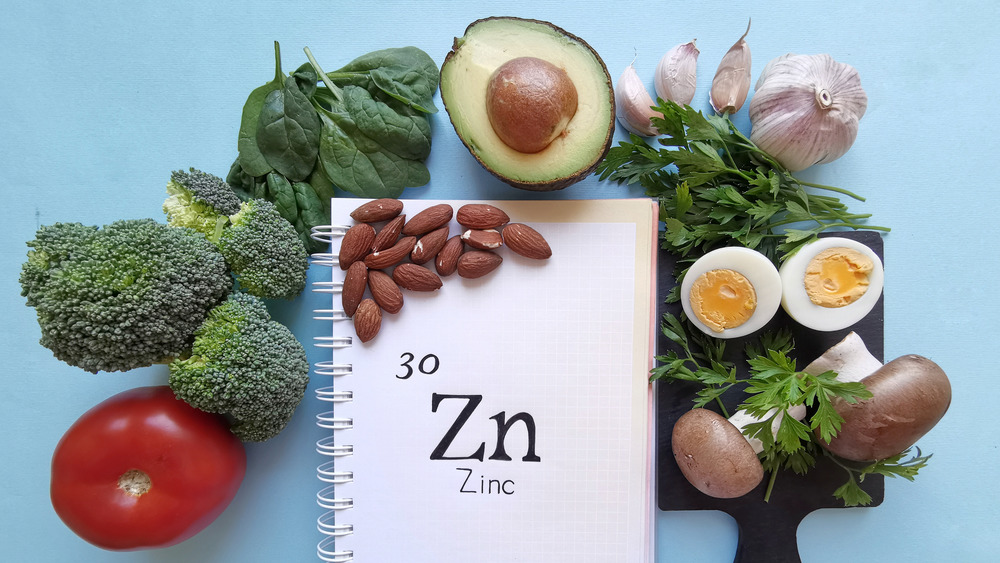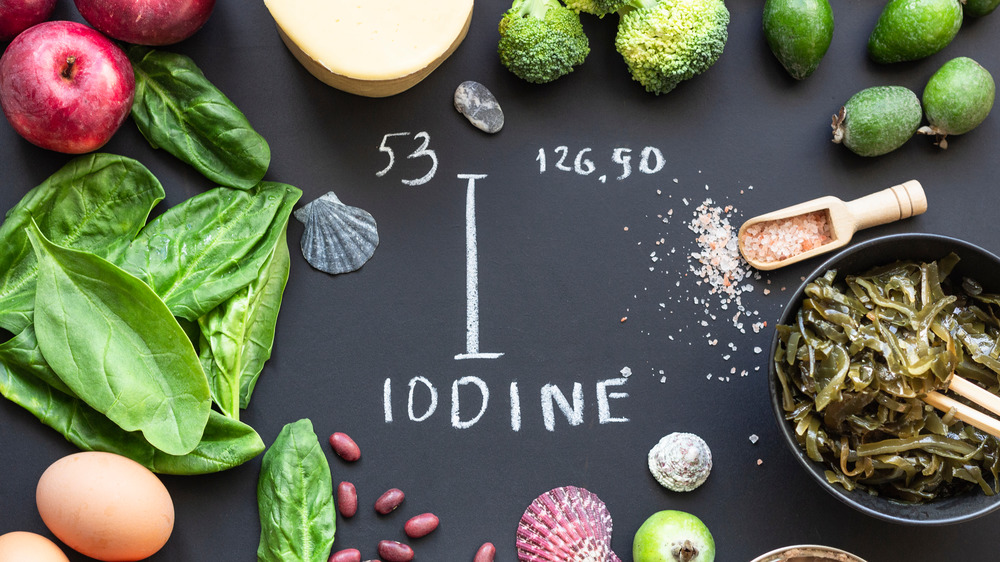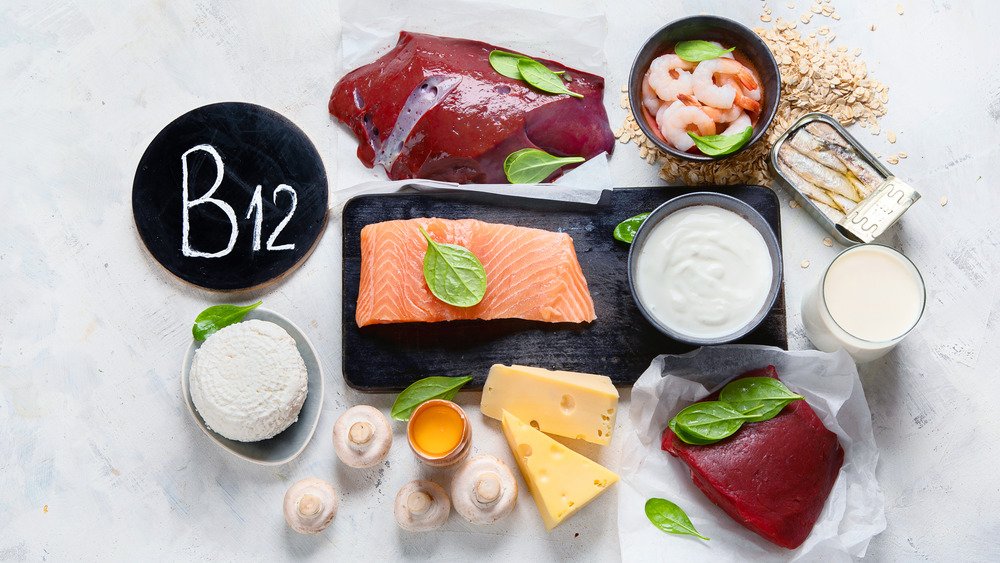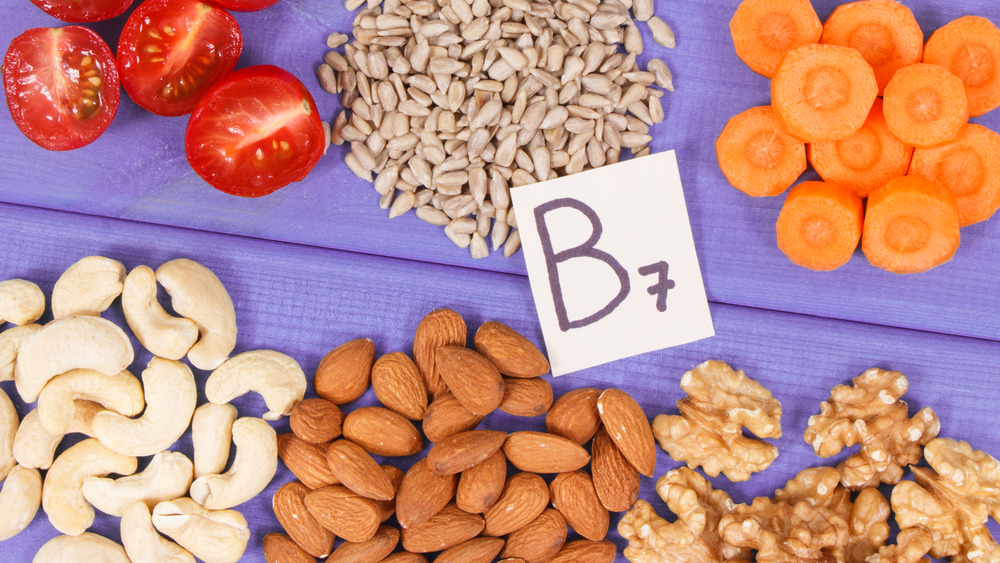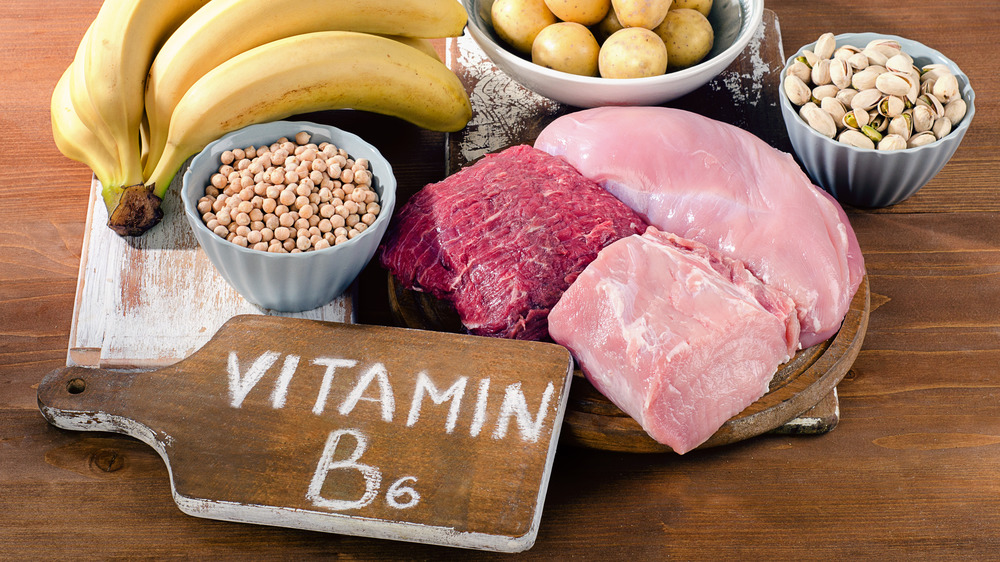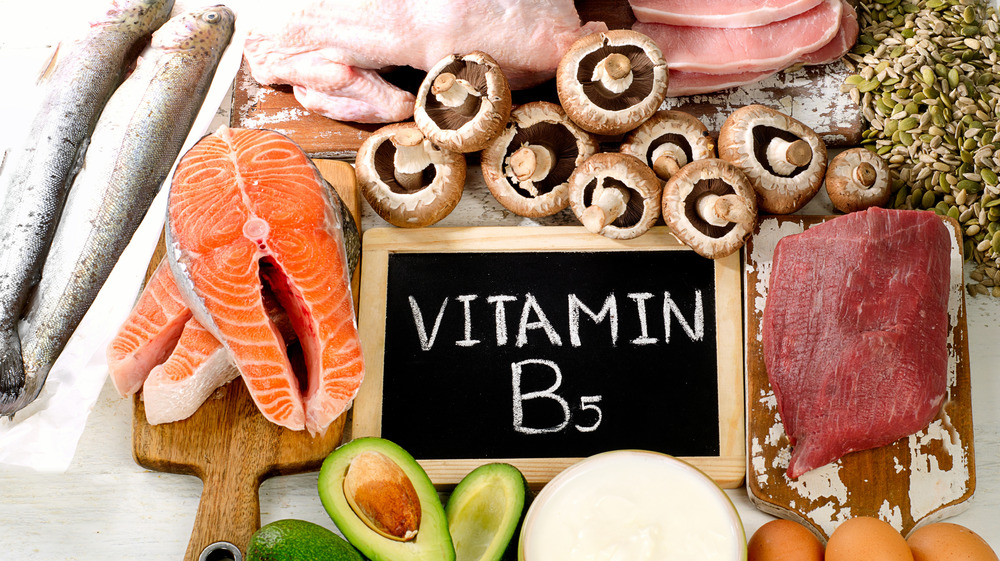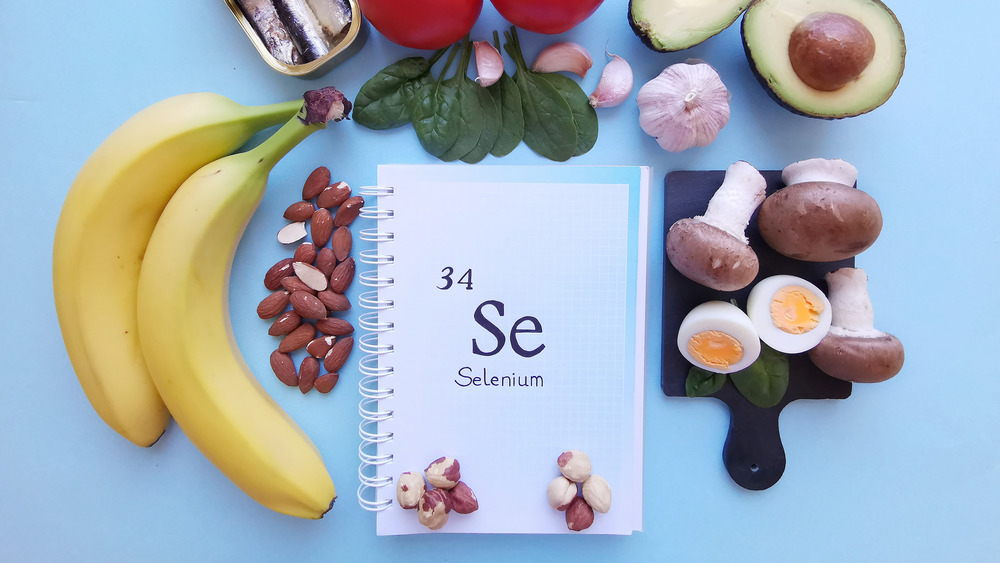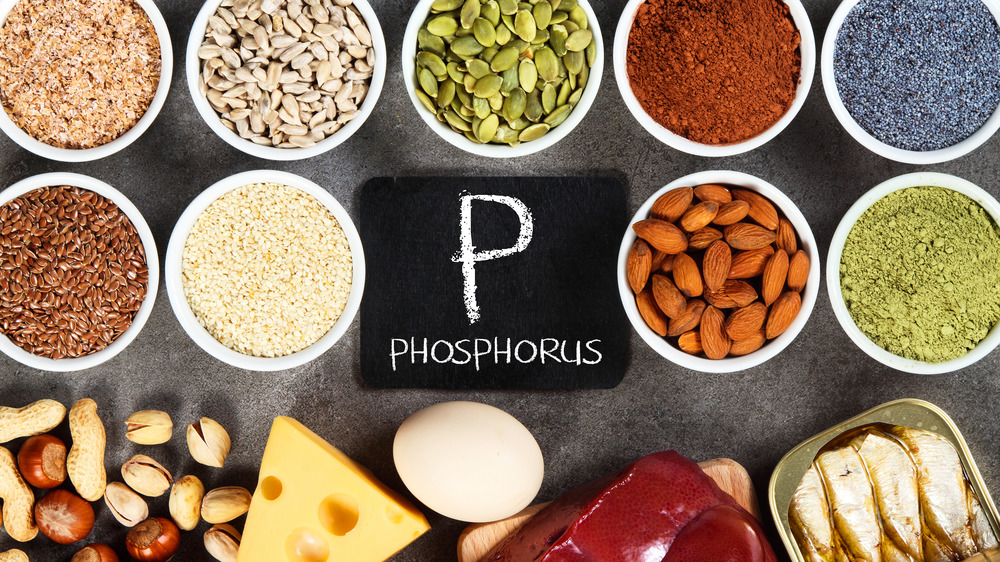If You Want To Lose Weight, Make Sure You Get Enough Of These Vitamins
Weight is a sensitive subject. Everyone has that ideal number they want to see on the scale but achieving and maintaining that number can feel impossible. So, it's no surprise that there are many supplements marketed to help you lose weight. But do they really work?
Well, the National Institute of Health (NIH) has put out a fact sheet on how effective or ineffective popular weight loss supplements are and if they're dangerous. For example, while green tea might help you lose a little weight and is safe in tea form, green tea extract can cause nausea, increase blood pressure, and has been connected to liver damage.
But don't give up on your healthy weight goals just yet. There are vitamins, as well as minerals commonly found in multivitamins, that can give your body the support it needs to lose weight. In fact, some of these vitamins should even be taken daily, and if you're having trouble with some stubborn pounds, it could be because your body has low levels of some of these important nutrients. Just keep in mind that it's still important to maintain a healthy lifestyle, and you should always talk to your health care professional before adding or subtracting vitamins and minerals from your diet.
Vitamin C can help you burn more fat
From fighting colds to being great for your skin, vitamin C has many benefits. But does this little antioxidant of a vitamin really help with weight loss? The answer is a bit complicated.
In 2007, the Journal of Nutrition ran a study that found no real connection between vitamin C supplements and weight loss (via Livestrong). Yet, a common factor for people who are overweight and even obese is they usually have low levels of vitamin C. Now, obviously, there are many factors that can lead to being overweight, and not all of them are in our control. But still, how can vitamin C fit into a weight loss plan?
As Livestrong explains, vitamin C helps your metabolism function, and the Journal of the American College of Nutrition published a paper in 2005 that offers evidence that vitamin C can help your body "burn more fat during moderate exercise." Plus, not having enough vitamin C can leave you feeling fatigued and less likely to want to hit the gym. So, while vitamin C is not a quick weight loss solution, it can make a difference in your overall weight loss plan.
Trying to lose weight? Don't skimp on your iron intake
There's a reason Marvel's Tony Stark called himself Iron Man. Metal super-suit aside, we associate iron with strength. Beyond symbolism, however, iron in a very concrete, scientific way, makes us stronger.
Like your own personal essential worker, it's the iron in your blood that helps transport and deliver oxygen throughout your body (via Healthline). For your muscles, this much-needed oxygen helps them burn fat, which is important for losing weight. In addition, not having enough iron can lead to less energy to the point you feel weak and/or fatigued and you have less physical endurance—all of which make it harder to exercise.
Fortunately, if you're worried your iron is low, you can up your iron intake by eating foods like spinach, shellfish, lean meats, and beans (via Healthline). You also might want to eat more foods rich in vitamin C like oranges, strawberries, and tomatoes since the C vitamin can help your body absorb iron. But it's important to talk to your health care professional before starting iron supplements.
Magnesium: your metabolism's best friend
By now, you're probably already picking up on a common thread. The key to losing weight is maintaining a healthy metabolism, which is essential to your body's production of energy. And magnesium is vital for both.
Simply put, your body needs specific chemical reactions to occur in order to generate those energy levels that you need to metabolize your food and take on those exercise routines (via Medical News Today). Take magnesium out of the equation, and these chemical reactions will not happen. Think of it as a science fair volcano without the baking soda. Yes, it has "lava" in it, but it's not going to erupt.
Logically, low magnesium means less energy is produced by your body, which can slow down your metabolism and make workouts harder. The good news is magnesium is in foods like bananas, potatoes, legumes, nuts, whole grains, halibut, spinach, and salmon (via Medical News Today). And, of course, supplements and multivitamins are options, but again, you should always be careful before adding any new supplements to your regular routine.
If you want to burn calories, don't forget your vitamin B3
At first glance, it might be difficult to draw a connection between weight loss and niacin, a form of vitamin B3. Nevertheless, you don't want to overlook it when you're putting together your own personal weight loss plan.
While magnesium is important to help your body produce energy, vitamin B3 keeps those energy levels high (via Livestrong). In fact, it's so important to your energy levels that if you're low on B3, you could feel drained, which makes burning calories more difficult for your body.
While B3 is available as a supplement, you can also get it from foods like eggs, fish, nuts, poultry, and lean meats (via Livestrong). And bonus: foods high in vitamin B3 tend to have fiber, which can help you maintain a healthy weight. If you do opt for the supplement, it may help with other health issues like high cholesterol, diabetes, and cataracts, as well as reduce your risk of a heart attack. Still, everyone's body is different, so always check with your health care professional before starting any new supplement.
Low levels of vitamin B1 can contribute to obesity
Okay, confession time. There are quite a few B vitamins on this list. But each one can impact your body in different ways. Case in point, vitamin B1, like its other B vitamin "cousins," can be an important component to a weight loss strategy, but in its own unique way.
Also called thiamin, vitamin B1 is essential for your body to metabolize glucose, according to a study in Advances in Nutrition. In fact, there is evidence to suggest that low levels of B1 can contribute to obesity, as well as heart and nervous system complications that can be fatal. And unfortunately, your body can deplete its reserve of B1 in as little as two to three weeks.
Okay, time for some good news. Vitamin B1 is in many types of foods ranging from beef, eggs, and pork to whole grains, nuts, and legumes. So, you have plenty of options to incorporate it more into your daily diet without going over your calorie count. One final note: if you've had bariatric surgery to treat obesity, be aware that your body could be drawing more from your B1 reserve, which can cause weight gain.
Not enough vitamin A can slow down your metabolism
If you usually have carrots in your salad or enjoy a little cantaloupe at breakfast time, you're already consuming vitamin A. And while this might sound like a small matter, it's actually very important because most Americans are not getting enough of this essential nutrient (via the National Institutes of Health). And, yes, low levels of vitamin A can lead to weight gain.
As Livestrong explains, vitamin A is important to help regulate your thyroid's hormones. When your level of vitamin A drops, it has a domino effect in your body since your thyroid's hormones help regulate your cells' energy usage, which in turn impacts how fast or slow your metabolism functions. And as we've learned from various weight loss commercials, a slow metabolism can cause an increase in weight.
Although supplements are an option for increasing your vitamin A intake, you can also get it from tuna, sweet potatoes, spinach, and butternut squash (via Livestrong). One word of caution: while it takes a long time and requires very large amounts of vitamin A to cause you any health issues, in excess, it can be toxic.
Want to lose weight? Take zinc (but not too much)
Zinc's connection to weight has felt contradictory at times. Yes, you could lose weight if you don't take in enough zinc, yet there is evidence to suggest zinc helps with obesity (via Livestrong). But understanding how zinc impacts your body will help clear this up.
Zinc helps you maintain your senses of smell and taste. Logically, if you have less zinc in your body, this could make food less appetizing, which may explain why some people with low zinc lose weight. However, Biological Trace Element Research published a study in 2013 (via Livestrong) that found obese individuals usually had lower levels of zinc. And that same year, Advanced Pharmaceutical Bulletin published a study that found zinc supplements helped with weight loss in connection to obesity.
The bottom line is zinc is important for your overall health and is more likely than not to help you reach your ideal healthy weight. But remember, overdoing zinc supplements can have some serious consequences, including headaches, vomiting, and a weaker immune system (via Livestrong). So, you might want to opt for foods like nuts, legumes, and dark-meat poultry to increase your zinc intake.
Not enough iodine may increase fat storage
While vitamin A helps regulate your thyroid's hormones, there would be no hormones to regulate without iodine, per Healthline. This important nutrient actually helps your thyroid manufacture these hormones and is so essential that low levels of it can lead to learning difficulties and swelling in the neck, as well as health concerns for women who are pregnant.
Circling back to weight, thyroid hormones are important for your metabolism to function properly (via Livestrong). Although an increase in weight can be from low levels of vitamin A in your body, it also could be that you don't have enough iodine, per Healthline. Remember, a slower metabolism means less of the calories you consume are being converted into energy and instead are being stored in your body as fat.
Chances are iodine is in your daily multivitamin, but you can also get it from seafood (via Healthline). And, of course, iodized salt has the mineral right in its name, but salt can be tricky when it comes to dieting and your health in general, so don't overdo your salt just to up your iodine.
Does vitamin B12 affect your weight?
Like zinc, vitamin B12's relationship to weight hasn't always been clear. Also called cobalamin, having a deficiency of this B vitamin can cause loss of appetite (via Healthline). So, then you can lose weight if you have low levels of B12? Well, it's not that simple.
Remember, losing weight in the safest and most effective way requires both a healthy diet and exercise. Sure, cutting back on certain foods will help you shed some pounds, but without exercise that fits your unique needs, keeping that weight off in the long term can be extremely hard. And this is how B12 fits into the picture. As Healthline notes, when your B12 levels go down, so does your energy to the point that you can become fatigued. Constantly feeling that exhausted makes sticking to a regular exercise routine even more challenging, which is the last thing you need when you're trying to lose weight.
In addition, to supplements, vitamin B12 is also available in liquids and lozenges. You can also increase your B12 intake through foods like eggs, milk, fish, meat, and poultry, as well as fortified foods like soy milk and some breakfast cereals.
Vitamin B7 helps your body break down fat
If you're looking for another fat-busting vitamin to add to your regime, biotin (or B7) may be a good option for you. This little powerhouse not only helps you break down fat but also helps process carbs and amino acids (via Healthline). Remember, the better your metabolism functions, the more weight you'll potentially shed. And, of course, because it helps your body metabolize food, B7 (like other members of the B vitamin family) also helps your body create energy.
Beyond your metabolism, B7 also supports your nervous system, as well as helps keep your liver, eyes, and hair healthy (via Healthline). When paired with chromium picolinate, it is a proven effective treatment for controlling glucose levels in diabetics who are also obese. It also can be helpful for individuals with hypoglycemia (lower than normal blood sugar) and hyperlipidemia or high cholesterol.
While B7 is available as a supplement, Healthline recommends to not begin adding B7 to your daily vitamins without first speaking to your health care professional. In addition, you can increase your B7 intake by including more foods like salmon, milk, nuts, and carrots in your diet.
What's the connection between vitamin B6 and your metabolism?
Does your typical daily to-do list have more than 100 items on it? Chances are it doesn't — unless you're vitamin B6. Also known as pyridoxine, this busy B vitamin is essential for more than 100 different enzyme reactions in your body (via Medical News Today). And on the top of B6's to-do list is helping your metabolism break down carbs, fat, and proteins, so your body will have energy.
Unfortunately, there is some bad news. As Medical News Today explains, because vitamin B6 is water-soluble, your body doesn't store extra. Instead, any excess of this overachieving little vitamin is expelled from the body through urination. And such is the case with many vitamins, low levels of B6 can cause health issues. In fact, obese individuals are more likely to be B6 deficient.
So, it's important to keep your B6 intake up on a daily basis. But don't worry, B6 is found in a number of foods like yellowfin tuna, bananas, potatoes, tofu, beef liver, chickpeas (also called garbanzo beans), and nuts.
Turn fat into energy with vitamin B5
Another B vitamin on this list is pantothenic acid (a.k.a. vitamin B5). Not surprisingly, this member of the B family is key for metabolic function and creating energy. Specifically, B5 aids your body in metabolizing fat, carbohydrates, and protein (via WebMD). And as MedlinePlus notes, B5, along with biotin (vitamin B7), is essential for the creation of fatty acids, which store energy in our bodies.
In addition, according to WebMD, women need more B7 depending on if they are pregnant or breastfeeding. An adult normally requires 5 milligrams of this B vitamin each day, however, a woman who is expecting needs 6 milligrams/day, and women who are breastfeeding need to increase that dose to 7. So, if you've recently given birth and are struggling with that leftover baby weight, it could be you need more vitamin B7.
Fortunately, B5 is like its fellow B vitamins and can be found in a variety of foods. As MedlinePlus notes, foods rich in this vital vitamin include avocado, broccoli, kale, eggs, milk, mushrooms, whole-grain cereals, lentils, and proteins that come from animals like poultry and organ meat.
Selenium can help reverse a slow metabolism
Your thyroid is a small gland that can have major effects on your whole body. In the case of hypothyroidism, that can result in a total feeling of sluggishness. As Medical News Today explains, hypothyroidism occurs when our thyroid does not produce enough hormones. The results? Your metabolism may become slower, which reduces the conversion of fat into energy. This can lead to both your weight going up and a general feeling of fatigue.
So, how does selenium fit into this? Well, this micronutrient is not only found in some multivitamins but is also in the tissues of your thyroid. While it can act as an antioxidant, it also helps your thyroid produce those hormones that are so important for your metabolism and energy levels.
If you feel your thyroid is not functioning properly, you should speak with your health care professional. And if your selenium levels are low, then you may want to incorporate more of the following foods into your diet: whole wheat bread, oatmeal, Brazil nuts, turkey, ham, eggs, shrimp, tuna, and chicken (via Medical News Today).
Support your metabolism and workout with phosphorus
Found in multivitamins, phosphorus is essential for many of our most basic functions. From helping to keep our nervous system firing on all cylinders to supporting proper kidney function, this little nutrient is important to our basic wellbeing (via Medical News Today). And, yes, it's also connected to maintaining a healthy weight and exercise routine.
As Medical News Today explains, phosphorus helps your body metabolize carbs and regulate how it uses and stores energy. Do you contract your muscles while you exercise? Obviously, you do, and you can in part thank phosphorus for that, as well as your muscles recovering from that spin class or weight training session. In addition, phosphorus is important for bone strength and regulating your heartbeat, so this is a mineral you definitely do not want to be without for your workout.
While phosphorus is available in foods like low-fat yogurt, nuts, chicken, and pork, diabetics who take insulin might need more phosphorus than nondiabetics (via Medical News Today). However, overdoing your phosphorus intake can lead to serious health issues like stroke or heart attack, so as always, check with your health care professional first.

